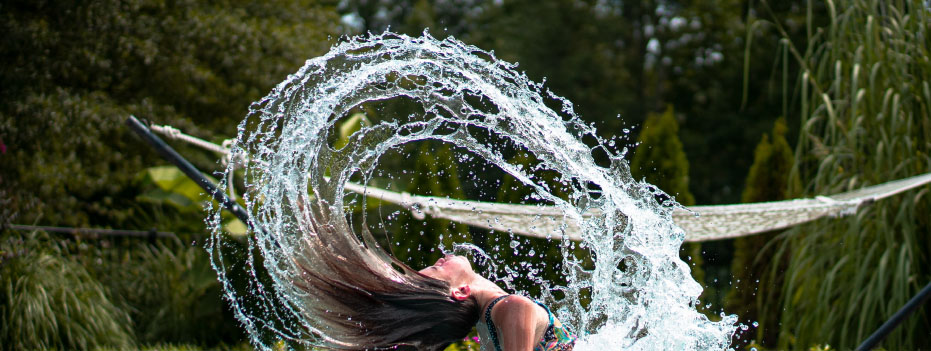Understanding How A Solar Pool Heater Works
One way you can keep the water in your fibreglass pool heated is with a solar pool heater. In solar pool heaters, the water from the pool is passed through several tubes. These tubes are also known as solar absorbers and collectors. They are usually mounted either on the ground or on the roof of the building.

The heat from the Sun is used to circulate the water in your pool. Once it’s heated, it’s then returned to the pool. A solar pool heater is completely automated and can work seamlessly with the pool equipment that you have. You can use the control panel on your solar water heater, to set what temperature you want your pool to be heated to.
In your solar pool heater, there’s a motorised valve that’s automated, that is responsible for directing water towards solar panels. Then, it directs heat from the solar panels back towards the pool. This process will continue until either you’ve turned your pool filter off, or your pool has reached the desired temperature.
How Solar Pool Heaters Work
Solar pool heaters collect heat from the Sun and make use of that heat to raise the temperature of the water in your swimming pool. It pumps the water from the pool through the pool filter, and then back to the pool. On its journey back to the pool, the water has to pass through several solar collectors. These solar collectors heat the water as it’s passing through.
A solar pool collector can be made of different kinds of materials. What material your solar pool heater should be made of will depend on what kind of climate you have in your area. It will also depend on how you want to use your solar collectors. You could be someone who wants to use the pool when the temperature has gone above freezing temperatures. If this is the case then you’ll need to get a collector system that is glassless.
Unglazed And Glazed Solar Collectors
You can also find unglazed solar collectors. These are made using rubber that is heavy-duty, or sometimes plastic. Where plastic is used, this is first treated with UV light blocking. This helps to increase the longevity of solar panels.
An unglazed solar collector can be less expensive, and that also works great when used to heat indoor pools. Even in the winter months, if your pool is indoors, your solar heater will be able to keep it warm for you. Should you find yourself needing to close down your pool over the winter months, opting for an unglazed solar collector can be more cost-effective for you.
But there are several advantages to opting for glazed systems as well. A glazed collector system is actually more efficient at exchanging heat, and also capturing heat from the Sun, than an unglazed collector system. This means, no matter what the climate in your area is like, your glazed collector system will help keep your pool water warm.

What You Need To Know About The Workings Of Solar Pool Heaters
First, water from the pool is pumped through till it reaches the solar collector. Before reaching the collector, the water needs to go through filters, which remove any foreign debris from the water. When this water reaches the solar collector, it gets warmed by the heat energy from the Sun. Then, the water is returned to your fibreglass pool.
In case you live in an area with warmer weather, you can even use your collector to cool down the water in your pool, during summer. This happens if you allow the water in your pool to circulate at night, through your solar collectors.
Flow control valves are used to divert water towards the solar collector when the temperature of the solar collector is higher than that of the water in the pool. Should the temperature of the solar collector be the same as that of the water in the pool, however, the water will only pass through the solar collector. It won’t get heated and will return to your pool at the same temperature as when it left.
How Can You Select A Solar Water Heater?
It can be expensive to buy a solar water heater. But once you get a good quality solar water heater installed, it can last for many years. Good solar water heaters can efficiently heat the water in your pool for seven years at least.
But before you buy a solar water heater, there are several things that you need to evaluate. These include:
- Determine how much access to solar energy your home has. How effective your solar pool heater will be will depend on how much sunlight it can catch.
- What size you want your solar pool heater to be, is the next point to consider. If your pool is larger, and if your swimming seasons are longer, then you may need a bigger solar pool heater. The temperature of the place where you live, as well as your desired pool water temperature, should also be considered.
- Consider whether your solar collectors will be mounted near your pool, on the roof of your home, or elsewhere. It should have decent exposure to sunlight.
- Before you buy a solar pool heater, first estimate how much using it will cost compared to other pool heating systems.
- Look also at the total installation cost as well as maintenance and how many solar panels you’ll be needing, and what thermal performance rating your solar collectors have.
- There are building code requirements that need to be met before a solar pool heater can be installed. You’ll also need to maintain your solar pool heater properly, to ensure that it works efficiently for at least five to ten years.

Conclusion
Solar pool heaters can help you effectively heat the water in your swimming pool. However, there are several factors you should consider before you get a solar pool heater for your home. From how solar pool heaters work, to whether you should get one or not, this guide can help you learn everything you need to know about solar pool heaters.
Understanding How A Solar Pool Heater Works
One way you can keep the water in your fibreglass pool heated is with a solar pool heater. In solar pool heaters, the water from the pool is passed through several tubes. These tubes are also known as solar absorbers and collectors. They are usually mounted either on the ground or on the roof of the building.

The heat from the Sun is used to circulate the water in your pool. Once it’s heated, it’s then returned to the pool. A solar pool heater is completely automated and can work seamlessly with the pool equipment that you have. You can use the control panel on your solar water heater, to set what temperature you want your pool to be heated to.
In your solar pool heater, there’s a motorised valve that’s automated, that is responsible for directing water towards solar panels. Then, it directs heat from the solar panels back towards the pool. This process will continue until either you’ve turned your pool filter off, or your pool has reached the desired temperature.
How Solar Pool Heaters Work
Solar pool heaters collect heat from the Sun and make use of that heat to raise the temperature of the water in your swimming pool. It pumps the water from the pool through the pool filter, and then back to the pool. On its journey back to the pool, the water has to pass through several solar collectors. These solar collectors heat the water as it’s passing through.
A solar pool collector can be made of different kinds of materials. What material your solar pool heater should be made of will depend on what kind of climate you have in your area. It will also depend on how you want to use your solar collectors. You could be someone who wants to use the pool when the temperature has gone above freezing temperatures. If this is the case then you’ll need to get a collector system that is glassless.
Unglazed And Glazed Solar Collectors
You can also find unglazed solar collectors. These are made using rubber that is heavy-duty, or sometimes plastic. Where plastic is used, this is first treated with UV light blocking. This helps to increase the longevity of solar panels.
An unglazed solar collector can be less expensive, and that also works great when used to heat indoor pools. Even in the winter months, if your pool is indoors, your solar heater will be able to keep it warm for you. Should you find yourself needing to close down your pool over the winter months, opting for an unglazed solar collector can be more cost-effective for you.
But there are several advantages to opting for glazed systems as well. A glazed collector system is actually more efficient at exchanging heat, and also capturing heat from the Sun, than an unglazed collector system. This means, no matter what the climate in your area is like, your glazed collector system will help keep your pool water warm.

What You Need To Know About The Workings Of Solar Pool Heaters
First, water from the pool is pumped through till it reaches the solar collector. Before reaching the collector, the water needs to go through filters, which remove any foreign debris from the water. When this water reaches the solar collector, it gets warmed by the heat energy from the Sun. Then, the water is returned to your fibreglass pool.
In case you live in an area with warmer weather, you can even use your collector to cool down the water in your pool, during summer. This happens if you allow the water in your pool to circulate at night, through your solar collectors.
Flow control valves are used to divert water towards the solar collector when the temperature of the solar collector is higher than that of the water in the pool. Should the temperature of the solar collector be the same as that of the water in the pool, however, the water will only pass through the solar collector. It won’t get heated and will return to your pool at the same temperature as when it left.
How Can You Select A Solar Water Heater?
It can be expensive to buy a solar water heater. But once you get a good quality solar water heater installed, it can last for many years. Good solar water heaters can efficiently heat the water in your pool for seven years at least.
But before you buy a solar water heater, there are several things that you need to evaluate. These include:
- Determine how much access to solar energy your home has. How effective your solar pool heater will be will depend on how much sunlight it can catch.
- What size you want your solar pool heater to be, is the next point to consider. If your pool is larger, and if your swimming seasons are longer, then you may need a bigger solar pool heater. The temperature of the place where you live, as well as your desired pool water temperature, should also be considered.
- Consider whether your solar collectors will be mounted near your pool, on the roof of your home, or elsewhere. It should have decent exposure to sunlight.
- Before you buy a solar pool heater, first estimate how much using it will cost compared to other pool heating systems.
- Look also at the total installation cost as well as maintenance and how many solar panels you’ll be needing, and what thermal performance rating your solar collectors have.
- There are building code requirements that need to be met before a solar pool heater can be installed. You’ll also need to maintain your solar pool heater properly, to ensure that it works efficiently for at least five to ten years.

Conclusion
Solar pool heaters can help you effectively heat the water in your swimming pool. However, there are several factors you should consider before you get a solar pool heater for your home. From how solar pool heaters work, to whether you should get one or not, this guide can help you learn everything you need to know about solar pool heaters.





